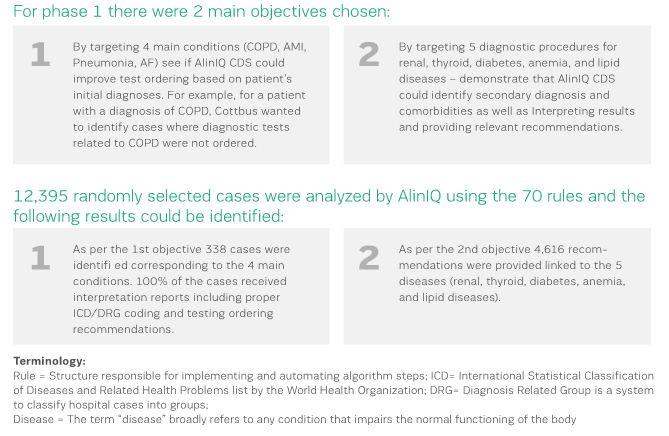How can a clinical decision support system help to achieve measurably better
healthcare outcomes?
The Collaboratory” reflects the transformation
through collaboration that
Abbott wants to ignite by working in
partnership with clients. Abbott supports healthcare
organizations to overcome their challenges
and materialize their future state vision, by breaking
down the silos and barriers that exist today in
healthcare. The results of a global study show the
contribution expected from labs to facilitate this
transformation as shown in the data points below.
By leveraging their data and teaming up with
other services and stakeholders, labs can shift
from being a manufacturing facility to a decision
support engine, helping the decision making
across the system and achieve measurably better
healthcare performance.
With advancements in medical research and
technology breakthroughs happening daily,
doctors and clinicians must remain on top of
latest medical guidelines, patient historical and
holistic information to reduce unwarranted variations,
improve patient outcomes and reduce
costs.
The Limbach Group is a leading private provider
of laboratory services in Germany, with more than
6,000 staff and 32 laboratories. MVZ Cottbus,
the group’s laboratory, serves four hospitals and
a rehabilitation center, and provides diagnostic
services for a population of more than 1 million
people. Burdened by the extensive employeehours
needed to process and analyze laboratory
data, MVZ Cottbus, in partnership with Abbott,
recently completed phase 1 of a project to establish
how the use of Abbott’s AlinIQ Clinical Decision
Support (CDS) solution could: 1) standardize
the application of clinical guidelines and evidencebased
medicine, 2) improve clinician test-ordering
practices, 3) save laboratory time and resources,
and 4) improve the quality of reports provided to
clinicians. According to Dr. Peter Thorausch, cofounder
and CEO “A huge part of our time is spent
processing and analyzing data and writing reports.
Being able to automate much of this work – and
providing guidance to the requesting clinician –
will lead to smarter, leaner and quicker diagnostics
and ultimately adding real value to the services
we provide.”
After 3 months, the MVZ Cottbus phase 1 of
the project demonstrated that AlinIQ CDS was
able to provide recommendations to improve test
ordering and identify secondary diagnosis and
comorbidities. The implementation of CDS live
has the potential to improve patient outcomes,
materialize operational efficiencies and achieve
cost savings. Additionally, with just the 70 rules
created by MVZ Cottbus and Abbott in this phase,
AlinIQ CDS not only recommended testing and
provided results interpretations for the four ICD/
DRG targeted conditions, but also for other conditions
that originally were outside the scope of
the project. These results show the benefits that
AlinIQ CDS can deliver for healthcare organizations.
Beyond that, AlinIQ CDS flagged potential
co-morbidities for further investigation, which
could have a significant impact in terms of optimizing
patient treatments and improving reimbursement
coding for the organization.
Following the success of phase 1, AlinIQ CDS
has now been integrated with the laboratory’s
database and live data streams at MVZ Cottbus
to enable real-time analysis and reporting. Prior
to commencing this phase, Abbott trained the
staff to ensure a smooth transition and the
team worked to review the results of the phase
1 and adjust the CDS rules before the system
went live with reports and comments for the
physicians. Additional work is ongoing to evaluate
the strategic, operational and financial
impact of AlinIQ CDS in a live setting, comparing
performance metrics against the baseline
benchmark. In the future, MVZ Cottbus will be
able to expand the reach of AlinIQ CDS to other
clinical use cases, disease states and laboratory
locations. Additional data streams will be integrated
to enrich the clinical information available
and enhance the generation of patient-specific
recommendations.
For further information please talk to our experts at the Abbott booth during Arab Health or
MEDLAB 2019, get in touch with a local Abbott representative, or send an email to wired@
abbott.com.





















